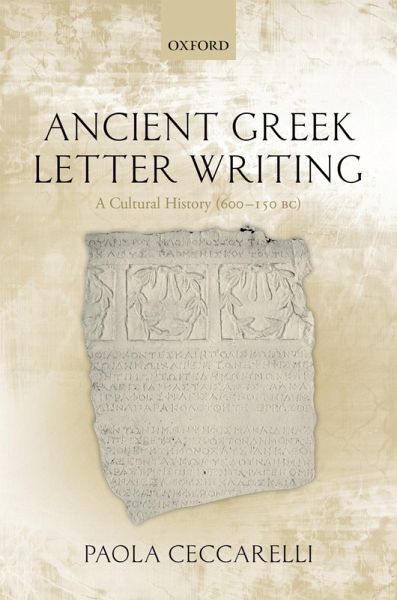
Ancient Greek Letter Writing (eBook, PDF)
A Cultural History (600 BC- 150 BC)
Versandkostenfrei!
Sofort per Download lieferbar
69,95 €
inkl. MwSt.
Weitere Ausgaben:

PAYBACK Punkte
35 °P sammeln!
In this volume, Ceccarelli offers a history of the development of letter writing in ancient Greece from the archaic to the early Hellenistic period. Highlighting the specificity of letter-writing, as opposed to other forms of communication and writing, the volume looks at documentary letters, but also traces the role of embedded letters in the texts of the ancient historians, in drama, and in the speeches of the orators. While a letter is in itself the transcription of an oral message and, as such, can be either truthful or deceitful, letters acquired negative connotations in the fifth century...
In this volume, Ceccarelli offers a history of the development of letter writing in ancient Greece from the archaic to the early Hellenistic period. Highlighting the specificity of letter-writing, as opposed to other forms of communication and writing, the volume looks at documentary letters, but also traces the role of embedded letters in the texts of the ancient historians, in drama, and in the speeches of the orators. While a letter is in itself the transcription of an oral message and, as such, can be either truthful or deceitful, letters acquired negative connotations in the fifth century, especially when used for transactions concerning the public and not the private sphere. Viewed as the instrument of tyrants or near eastern kings, these negative connotations were evident especially in Athens where comedy and tragedy testified to an underlying concern with epistolary communication. In other areas of the Greek world, such as Sparta or Crete, the letter may have been seen as an unproblematic instrument for managing public policies, with inscriptions documenting the official use of letters not only by the Hellenistic kings, but also by some poleis.
Dieser Download kann aus rechtlichen Gründen nur mit Rechnungsadresse in A, B, BG, CY, CZ, D, DK, EW, E, FIN, F, GR, HR, H, IRL, I, LT, L, LR, M, NL, PL, P, R, S, SLO, SK ausgeliefert werden.













